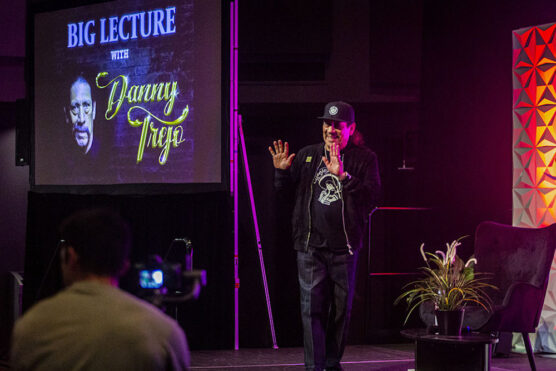When Danny Trejo was released from prison in 1969 after stints for crimes including armed robbery and drug dealing, and before he became one of today’s most recognizable actors, he returned to the neighborhood he grew up in and stole from.
One day, he noticed an older woman taking out her trash, and she seemed to be struggling. Trejo walked over to help her but she watched intently with fear before yelling at him in Spanish. She knew who he was and what he did. After helping her, he felt a sense of pride.
Once he experienced this selfless act, he wanted to continue helping people. He credits these actions to his professional success.
“Everything good that has happened to me has been a direct result of helping someone else,” Trejo said.
On Nov. 16, hundreds of people filled California State University, Northridge’s University Student Union Northridge Center, eager to hear from Danny Trejo, an entrepreneur and actor known for films including “Machete,” “From Dusk Till Dawn” and “Spy Kids.”
At this year’s Associated Students Big Lecture, Trejo reminisced on his upbringing and actions revolving around narcotics and robbery, and he stressed to his CSUN audience the importance of kindness and helping others.
“My whole life is dedicated to helping other people. That’s how I get through the day,” Trejo said.
Trejo, 79, spent most of his childhood in Los Angeles. He grew up with 11 aunts and uncles on his paternal side but was closest with the youngest brother, Gilbert, who was 6 years older than him.
When Gilbert was 14 years old, he began smoking marijuana, which led to Trejo’s introduction to it at only eight years old. It was easily accessible because at the time, in the 1950s, all they had to do was grow it in their backyard, he said. In his adolescence, Trejo got addicted to heroin. This path led him to selling drugs, resulting in him being in and out of detention camps, juvenile halls, and penitentiaries, sometimes for violent crimes. In 1968, he became sober after attending a 12-step recovery program.

Trejo reflects on his upbringing that led to his incarceration, at the Associated Students Big Lecture in the USU on Nov. 16, 2023. Photo by David J. Hawkins.
After his release he started working with Western Pacific Med Corp in 1969 helping detox people addicted to heroin, which he still continues to do. In the 1980s, a person he was sponsoring asked Trejo to meet him at his job — the set of the film “Runaway Train.” Someone working on the movie recognized him as the 1966 lightweight boxing champion in San Quentin State Prison. Director Andrei Konchalovsky hired him to play Eric Roberts’ opponent in a boxing scene that launched his acting career.
“My life changed. All of a sudden I could work two days and make as much money as my father did all month,” he said.
Many students in the audience wanted to hear exactly this, how he got his start. Estefanie Lopez, a student at CSUN, first saw Trejo in “Spy Kids.” She was curious to learn more about his upbringing and how he got to where he is today.
“I’m just really happy that we as students get this opportunity,” Lopez said.
Trejo turned his big break into an incredibly prolific acting career. He is also an entrepreneur, including restaurants with his name and face around Los Angeles.
Despite all his successes, Trejo has never abandoned his dedication to helping others.
“What have you done for somebody?” Trejo said. “The guy sitting next to you, your neighbor…check on them.”
Like this:
Like Loading...
Related





 Tweet This
Tweet This Facebook
Facebook Digg This
Digg This Bookmark
Bookmark Stumble
Stumble RSS
RSS
































REAL NAMES ONLY: All posters must use their real individual or business name. This applies equally to Twitter account holders who use a nickname.
0 Comments
You can be the first one to leave a comment.